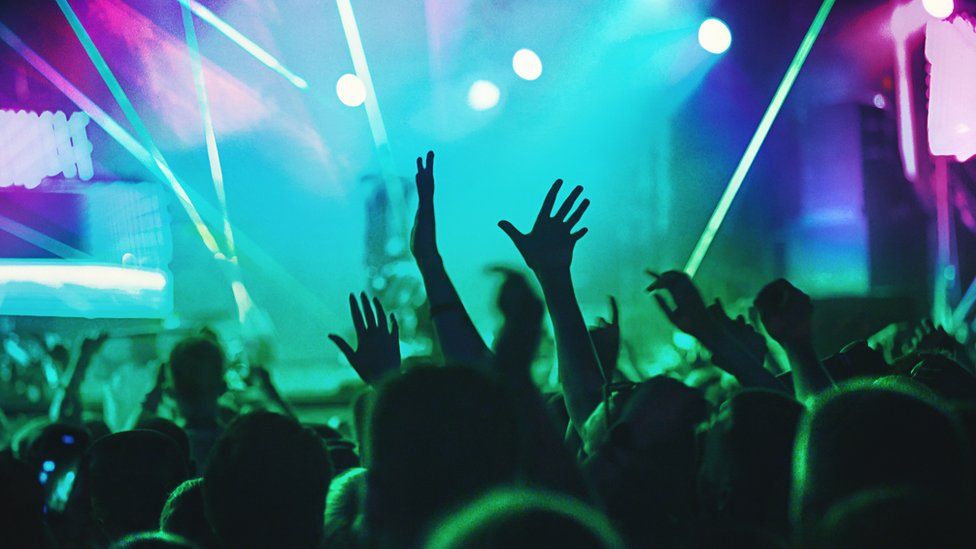Why did raves become illegal?
- Published

Strobe lights, thumping bass, a warehouse or field and hundreds, possibly thousands of sweat-drenched people dancing through the night.
Raves immediately conjure up those images but they're not ideal at a time of a global pandemic.
However, lockdown hasn't stopped some illegal raves from taking place around the UK, despite police warnings.
In UK law, an illegal rave is when 20 or more people are "gathering on land in the open air" with music "that includes sounds wholly or predominantly characterised by the emission of a succession of repetitive beats" - at a level where it is loud enough to cause "serious distress to the inhabitants of the locality".
But why did they become illegal in the first place?
Let's go back to the 1980s - when acid house arrived from America. A new cultural movement spread across the country. By the early 90s, raves were huge events with thousands of people.
As they got more popular, concerns about anti-social behaviour and drug use followed, leading to heavy policing and new laws.
In 1990 the UK passed the Entertainment (increased Penalties) Act, allowing fines of up to £20,000 for hosting illegal raves or parties.
The aftermath of a Bristol warehouse rave in 1995
Organisers got around the laws by broadcasting the details of events last-minute or on pirate radio stations.
Ravers could also call a telephone number where the voicemail had info about the event.
Unlikely to remember being there
But the party that changed everything took place on Castlemorton Common in Worcestershire in 1992.
The word was spread by an answering machine message: "Right, listen up revellers. It's happening now and for the rest of the weekend, so get yourself out of the house and on to Castlemorton Common... Be there, all weekend, hardcore."
Twenty-thousand people turned up.
Parking was a nightmare
The rave that changed the law
What was supposed to be a small free festival for travellers not only went down in history as the biggest illegal rave ever held in the UK, but resulted in a trial costing £4m and the passing of the Criminal Justice and Public Order Act.
That gave police the powers to stop vehicles anywhere within five miles (8km) of a rave and turn them away.
It also included rules targeting gatherings of more than 100 people listening to music at night.
After the laws changed illegal raves didn't really go anywhere.
Watch: Annie Mac's history of rave
Carl Loben, Editor of DJ Mag says that raves or "free parties" have continued across the country for the past 25 years.
"I lived in Hackney [in London] during the 90s and there was always a squat party - as they were called — going on every weekend," he tells Newsbeat.
Police confiscate speakers at a rave in the 90s
But most modern raves are as underground and as private as possible, unlike some of the earlier massive outdoor events.
"New blood often comes through to work alongside seasoned organisers," says Carl.
"The organisers used to pride themselves on this fact - there was always something happening, despite the legislation."
There have been reports of illegal raves in Telford, Leeds and Merseyside during lockdown, external.
A BBC investigation also found three illegal raves in London at the beginning of June.
"It's opportunistic newcomers looking to cash-in on young people wanting to party during lockdown," Carl says.
He says the free party crews that usually host events have stopped during lockdown "out of respect".
"Many DJs and others in the dance scene have been very against these."
On May 30, the UK's first social distanced legal rave took place in Nottingham,
Ravers were given face masks and hand sanitisers to keep safe and were told to stay two metres apart.
Carl thinks these legal, socially distanced raves are the way forward as we come out of lockdown.
"Otherwise there is going to be a plethora of illegal events springing up, organised by people with little or no experience, while there's a whole raft of experienced promoters sitting around at home with nothing to do.
"The lockdown and continuing lack of opportunities to dance to loud music together safely could lead to a summer a bit similar to one of the Summers Of Love in the late '80s. But there's the danger that some of these events will produce more of a Summer Of Chaos, unless the issue is addressed."
Follow Newsbeat on Instagram, external, Facebook, external, Twitter, external and YouTube, external.
Listen to Newsbeat live at 12:45 and 17:45 weekdays - or listen back here.
- Published28 May 2017
- Published19 June 2020
- Published25 June 2020